In March, the British government reached an agreement to purchase the Wylfa and Oldbury-on-Severn nuclear sites, marking a historic turning point. This is the first time since the 1960s that the government has acquired land for new nuclear facilities. This initiative is part of an ambitious plan to increase nuclear power capacity to 24 GW by 2050. The site of Wylfa, on the Isle of Anglesey, is being considered for a power station similar in scale to those at Hinkley Point and Sizewell. According to Claire Coutinho, Secretary of State for Energy Security and Net Zero, “this project will revive Wylfa’s nuclear history and bring thousands of jobs and investment to the region.”
Development prospects
The British government is currently in talks with international energy companies to explore the construction of this new power plant. The Wylfa project could become one of the largest foreign investments in Wales, with significant implications for energy security and the reduction of carbon emissions.
Tom Greatrex, chief executive of the Nuclear Industry Association, pointed out that “Wylfa is an ideal location for a major nuclear project, and the community knows a lot about nuclear power. A project like this would transform the region with high-quality jobs and clean energy.”
Technology and safety
EDF, the French energy company, has expressed interest in the project and is ready to offer its European Pressurized Reactor (EPR) technology. According to EDF, “two additional EPR units would be the safest choice, building on the skills and experience developed at Hinkley Point and Sizewell.” The Wylfa site, close to cooling water from the Irish Sea, is ideal for a new power plant. The UK government predicts that the plant could provide enough energy to power around 6 million homes for 60 years.
Economic and social implications
The revitalization of the Wylfa site is not only an energy project, but also an economic development driver for the region. It will create thousands of jobs and stimulate the local economy. The project also supports the UK’s goals of energy security and carbon neutrality by 2050. The UK is focusing on nuclear power to diversify its energy mix, reduce its dependence on fossil fuels and meet its climate targets. The current fleet of aging nuclear power plants requires new investment to maintain the country’s electricity production capacity.
The Wylfa nuclear power plant project represents a major step forward in the UK’s quest for cleaner, more reliable energy. With international partners and advanced technologies, this project could transform the country’s energy landscape and strengthen its position as a world leader in nuclear power.






















